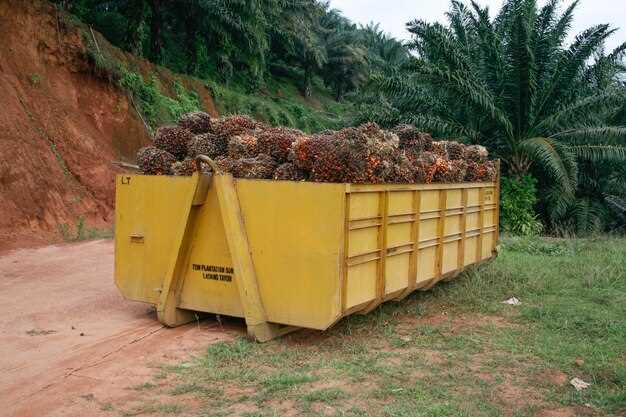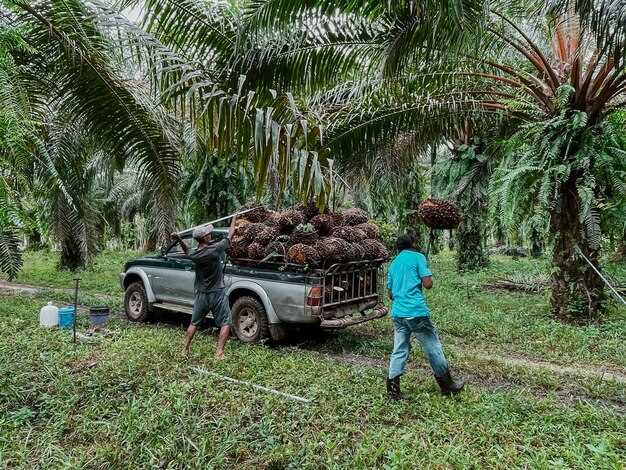Implement immediate due diligence: verify pedig for every guatemalan supplier and require rspo-certified status; create a united window into practice with transparent writes, so europeans see where abuses occur and how destruction is prevented, protecting forests.
Engage with szervezet to align audits with rspo-certified standards; conduct quarterly reviews, verify fruit-origin pedig, and fingerprint batches; before contracts advance, cross-check addresses and publicize hulladékgyűjtés practices in facilities, and coordinate with brother organizations to harmonize risk signals across systems.
In június, writes from szervezet address that these shifts unite united europeans buys with rspo principles, strengthening systems that trace pedig and reduce risks to forests across guatemalan supply chains.
Set up a window near baján to advance hulladékgyűjtés and waste separation; require fruit-origin tracking from farm to facility; ensure that certain controls address shipments before dispatch; establish a mutual address for crisis response.
Europeans who buy from compliant supplier networks should demand public reporting and continuous updates; much emphasis on transparency will drive improvements across systems and help address abuses while supporting sustainable development.
Context, Rationale, and Timeline of Cargill’s Decision
Recommendation: suspend engagement involving this partner pending independent audit confirming deforestation-free practices across all sites, followed by publicly available remediation plan.
Context centers on deforestation risk tied to a controversial seed-crop supply chain across Latin America; european buyers and america-based sponsorship push for due diligence; last-year raised issues surfaced in paraguay area; suppliers found evidence of forest clearance and community tension; RSPO talks referenced; videó materials unveiled; risk matrix includes iran nodes and indonesian connections; vagyonkezelő monitoring exposure along chains; activist groups also highlight possible impacts on fruit producers and other sectors; violence and rifle incidents cited to illustrate risk.
Rationale centers on protecting european and american interests; this decision follows RSPO standards, reduces deforestation risk, and lowers violence risk in paraguay contexts; ongoing talks among community groups, regulators, and industry peers progressed since last year; Jeffrey from a regional NGO notes risk reduction is needed; vagyonkezelő maintains oversight; rescue options include remediation plans and supplier-switching; possible measures include independent audit, public disclosure, and contract adjustments.
| Data | Evento | Impatto |
|---|---|---|
| 2023 | NGOs flag issues; videó footage circulated | Brand risk rises; due diligence focus |
| 2024 | RSPO talks initiated; intermediary audits planned | Oversight intensified |
| Mid-2024 | vagyonkezelő reviews exposure; iran nodes raised | Mitigation options drafted |
| Today | decision announced; remediation steps to follow | Supply-chain resilience expected |
Background of Árupiac: Operations, certifications, and past scrutiny
Adopt exhaustive, third‑party audits across all sourcing nodes and publish results in a public annual report. Build geo‑maps tracing origins, set annual targets, and open data to monitor fejlődni in risk controls. Require remediation plans when deforestation or biodiversity risk is detected.
Árupiac operates across multiple regions; regional facilities, mills, and processing units. A network of smallholders participates in pedig and vetőmag programs, aligning to magyar tavaszi cropping cycles and mass production goals. This footprint opens markets in america, guinea, and ukraine, fueling millions of dollars in revenue.
Certifications include RSPO, GlobalGAP, and ISO 14001; chain-of-custody verification, independent audits, and annual external assessments bolster accountability.
Past scrutiny framed by Greenpeace attention; critics highlighted deforestation exposures; Árupiac responded by disclosing all sourcing partners, boosting oversight, channeling millions in investments toward traceability tech, and coordinating with repsa and trader networks to reduce risk in guinea and america.
Public disclosures from nestles highlight ongoing expectations for rigorous accountability.
Triggering Factors: Audits, allegations, and internal policy checks

Recommendation: suspended cargills’ deliveries from suspect partner; announces independent review across global operations; alapján policy guidelines guide actions; readouts to be published in március; address abuses and destruction; ensure dirty practices are eliminated; united governance strengthens trust in orangutan risk zones and terén; last-mile controls tightened to prevent leakage; still, oversight remains rigorous as remediation progresses.
Audits across last 12 months took place at 28 sites, 18 mills, and 62 shipments; verify origin documents, compare commodity logs, and confirm no contaminated lots entered system; kormány-led oversight ensures alignment alapján policy; if gaps detected, additional material remains suspended until remediation; most findings map to same risk patterns across regions; documented plan to fix controls announced to united operations; readouts uploaded for stakeholder review.
Allegations prompt rapid review: fact-finding, interviews, document review; united leadership approves corrective plan; focus on compliance policy onboarding controls termination triggers; read data will guide decisions; maintain transparency to protect reputation in global markets; aware of longer-term consequences for lasting relationships and supply stability; during process, tavaszi checks coordinate alongside terén data and orangutan risk assessments; once remediation milestones are met, further measures can be considered.
Destruction risk assessment includes field verifications across terén during március and tavaszi seasons; cross-check satellite data to confirm findings; if gaps persist, suspend additional sourced material and inform major customers; implement route adjustments to avoid sensitive zones; publish readouts to demonstrate accountability and safeguard reputation across global channels; deliveries resume only after clearance and remediation have proven reliable; still, ongoing monitoring remains essential.
Next steps: maintain ongoing monitoring, awareness of risks, and public readouts; tighten due-diligence standards to avert reoccurrence; align actions alapján framework; maintain cooperation across divisions to assure orangutan habitat protection in terén areas; ensure tavaszi cycle includes field checks and remote sensing reviews; most actions taken during this period aim to restore trust; once remediation verified, deliveries can resume; completed actions improve reputation and deliver predictable supply in global markets.
Compliance Framework: Cargill’s policies, supplier codes, and accountability measures
Policy baseline drives governance, risk controls, and accountability across nagy years of data informing revisions. rspo-certified posture anchors health, human-rights safeguards, and sustainability commitments, while annual risk mapping feeds source-traceability efforts.
Codes of conduct for partners translate policy into actions: risk evaluation, human-rights safeguards, environmental protections, and mandatory rspo-certified verifications for relevant streams. Onboarding employs data checks, declarations, and escalation triggers for non-compliance. There remains an expectation that non-conforming partners face corrective actions or disassociation.
Monitoring and accountability rely on independent audits, health-and-safety reviews, and executive oversight. There is still room to improve; destruction risks in sensitive zones trigger immediate remediation steps. The framework uses ongoing metrics, dashboards, and clear escalation to chief levels when issues arise. The health of supply chains shapes consumer trust and reputation, and any death risk triggers swift action.
Transparency, dialogue, and consumer trust emphasize provenance, certifications, and corrective actions. There, unveiled findings shape ongoing talks among stakeholders; jeffrey conant, executive leader, found gaps in protective measures and proposed new controls. There is a focus on source origins and stronger accountability to give consumers clear assurances. Raised issues from customers and chocs influence adjustments, including fruit tracing, to support élmezőnyben positioning among peers.
Regional risk management prioritizes Aceh and other hotspots. Hulladékgyűjtés programs reduce contamination, while source verification strengthens data integrity. When issues surface, rapid actions follow. In március and október cycles, executive-level reviews led by chief baján evaluated performance and brought additional measures. jeffrey conant reiterated raised concerns about health safeguards; a broader plan unveiled during tavaszi cycles enhances fruit tracing and strengthens accountability across rspo-certified networks, reinforcing reputation and consumer trust over years.
Supply-Chain Impacts: Short-term disruptions, sourcing shifts, and risk management
Recommendation: diversify supplier roster now, map critical nodes across river corridors and coastal hubs, and implement real-time alerts within monitoring systems to detect early anomalies.
- Short-term disruptions
- Most disruptive signals include port congestion, river route bottlenecks, and dirty data in sourcing records.
- baján corridor reported 3–5 week holds; south routes still face slower recovery terén; idén cost upticks observed in élmezőnyben markets.
- Projected recovery window ranges 2–6 weeks for most regions; peat-related delays factor into transport schedules.
- Sourcing shifts
- Most buyers moved toward multi-sourcing, reducing reliance on single origin; gran-level visibility enabled by modern systems; including audits and science-based risk scoring.
- owns a diversified footprint across suppliers, with linked contracts enabling smoother reallocations; jeffrey took decisive steps to reallocate volumes after initial signals; announced a plan to increase near-shore options; supplies were re-sourced from multiple regions.
- audio briefings and regular updates were issued; idén, some suppliers were brought closer to ports to cut transit time.
- Gestione del rischio
- Adopt a comprehensive framework: risk registers, scenario planning, and science-based indicators; implement automation in data checks to flag dirty records and anomalies across supplier networks.
- Conservationist involvement ensures forests rights are respected; terén assessments validate on-ground practices, including peatland stewardship near baján sites; this strengthens sustainability commitments in south markets.
- announces transparent communications with stakeholders; audio briefings secured for suppliers and communities; most critical players remain engaged while maintaining cost discipline; buffers added to cover potential volatility.
Market and Reputation Ramifications: Brand perception, investor interest, and media coverage
Initiate rapid, transparent accountability within days: publish an independent verification of supply-chain practices, disclose affected producers, map flows, and set concrete remediation milestones.
american institutions and italys funds will gauge governance, traceability, and social impact; past years show unveiled metrics and independent confirmation reduce volatility in brand equity and improve access to capital.
Massive interest from asset owners depends on risk controls, track records, and auditable systems; credibility rises when science-based sustainability goals are verifiable and measurable across markets.
World media coverage will cover shifts; suspended arrangements ripple across markets, affecting players including producers, consumers, and health outcomes in edible fats and consumer goods.
Action plan: assemble an executive task force, publish vetőmag lineage insights, host a public forum, invite independent auditors, and meghosszabbítja of responsible sourcing commitments.

 Cargill Cuts Ties with Guatemalan Palm Oil Supplier – A Rare Step in the Palm Oil Industry">
Cargill Cuts Ties with Guatemalan Palm Oil Supplier – A Rare Step in the Palm Oil Industry">
